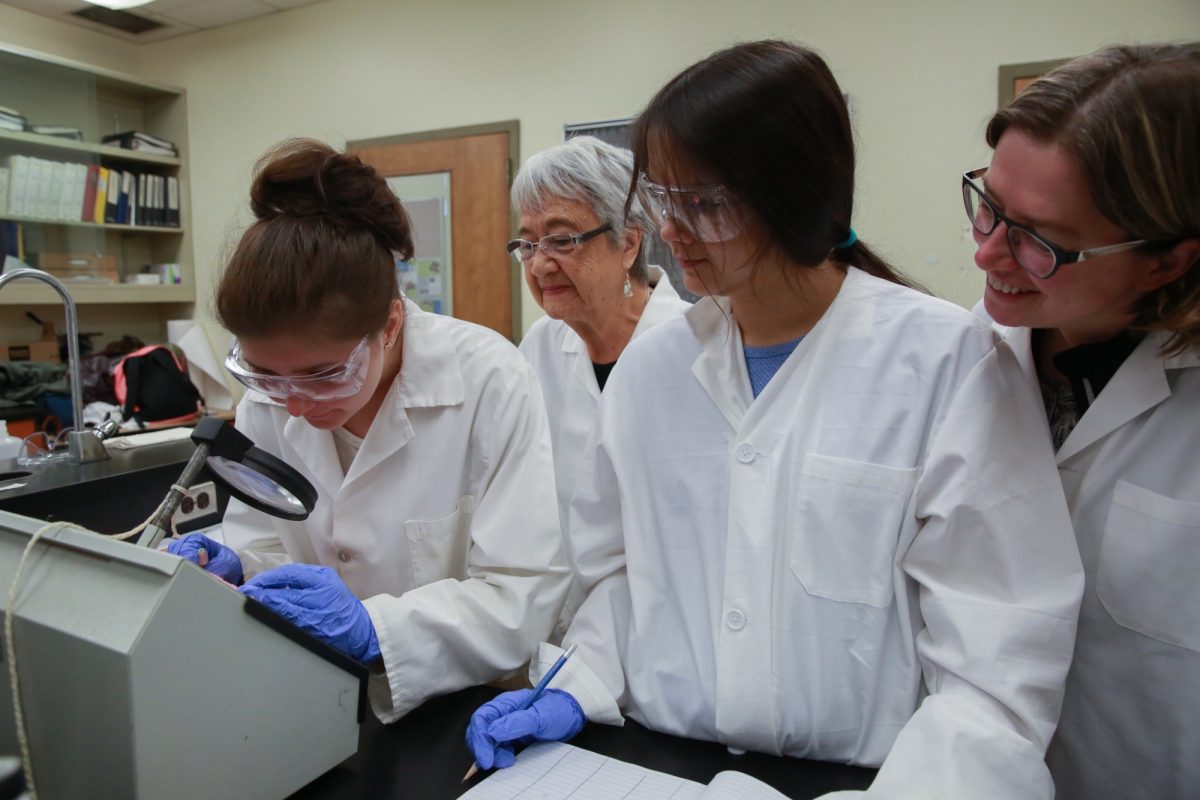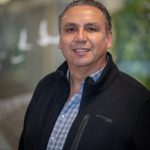
Students working in a lab as part of the Verna J. Kirkness Science and Engineering Education Program.
Faculty of Science introduces the Wawatay program for Indigenous students
New program will produce Indigenous scientists across Manitoba
Dennis Ballard is working with Manitoba First Nations to recruit Indigenous students interested in becoming Indigenous scientists and supporting health, environment, technology and industry in their own home communities.
Ballard is leading the new Wawatay program where the first cohort of UM Indigenous students will journey together through a bachelor of science degree. The long-term goal of the program is to see Indigenous scientists doing research and working in Manitoba.
“Not every student is going to be able to find employment in their home community but connecting them to industry and other possible avenues of employment beyond their education is going to be imperative to their growth,” Ballard says.
Wawatay will provide academic and personal support for students to take a science curriculum identical to what non-Indigenous students study while incorporating Indigenous traditions, knowledge, and values

Dennis Ballard, Wawatay Program Lead
Ballard, who is from Opaskwayak Cree Nation, is speaking with Indigenous education authorities, chiefs and their counsels to identify promising students and communities willing to participate in the Wawatay program.
“Whatever community the students come from, we want to work with the community leadership so students have access to research possibilities benefiting the home community immediately,” he says. “In some cases, a student’s early research may morph into an undergraduate thesis or a graduate dissertation.”
“The Wawatay program development was jump-started with the vision of Dr. Roger Dube, Sequoyah Fellow (AISES) and visiting UM Indigenous scholar known for his strong advocacy for Indigenous students,” says Dr. Samar Safi-Harb (Equity, Diversity and Community lead in Science). “Dr. Dube continues to work with the Indigenous Initiative Working group in Science providing mentorship, support and knowledge. With the support and insight of Dr. Stefi Baum, Faculty of Science Dean, this program is becoming reality.”
Wawatay, which is the Anishinaabe word for the Northern lights, was named by Ballard’s wife, UM professor and Indigenous Scholar Dr. Myrle Ballard, who is Ojibway. “Whenever I see the Northern lights, it makes me think of the past, present, and the future; your ancestors leading you on the path,” Dennis Ballard says. “That’s the concept for the program’s orientation; think beyond your immediate self to your future.”
Ballard says many UM professors in Science will likely engage in the Wawatay program. They will be introduced to “two-eyed seeing,” which Ballard says is a holistic approach to observing the natural world practiced long before the arrival of Europeans, and they will serve as research mentors to students.
Wawatay science program to launch this summer
While the COVID-19 pandemic may delay the launch of the program, Ballard says we’re working to be ready to welcome students (to be called Wawatay Scholars) in summer 2021. Students will be assessed for their knowledge of math, chemistry, physics and biology, as well as their computer skills. Academic support and tutoring will be provided throughout the program for those scholars requiring it.
The program begins with a six-week orientation through the summer to strengthen academic skills and build confidence before the Fall term.
“During orientation, we start by developing their leadership, emotional and diversity skills; all the entrepreneurial skills that they need. With research, we start them on the path to seeing themselves as Indigenous scientists, he says.
Ballard says it’s a big transition for many students; their first experience in a large city after living in small, tight-knit communities. He hopes to create a close cohort with students living in UM residence or close to the campus. The Indigenous Student Centre, Migizii Agamik (Bald Eagle Lodge) and science students’ associations are additional excellent resources for students studying away from home.

Tony Williams, Bachelor of Science (Honours) in Actuarial Mathematics from the University of Manitoba, graduating in 1977. National chair of the Verna J Kirkness Education Foundation.
UM science grad champions Indigenous learning
The concept of Wawatay was championed, in part, because of the vision of philanthropist Tony Williams (’77), a UM science graduate in actuarial mathematics.
“My own background is in science. I consider myself a scientist first and a business person second,” Williams says. “I’ve always believed in science and education and learning. So, as I got to the point where I could help others, it was natural for me to help out Indigenous students with science.”
Williams says his inspiration for supporting the Wawatay program came out of an Indigenous land claim initiated by the Samson Indian Band in central Alberta. The Ermineskin Cree Nation launched the suit over Treaty rights related to the Band’s oil and gas deposits.
Williams’ testimony as an expert witness resulted in the federal government returning approximately $400 million of the Band’s money. The Samson Cree Nation established a trust fund for future generations and Williams decided to make his own gift to Indigenous youth at UM.
“When I retired, I was very fortunate. I was able to sell my business, make a bit of money, and I decided to give something back,” Williams says. “I established an endowment fund at the University of Manitoba. The purpose of the gift was to support Indigenous students studying science at the University of Manitoba.”
Williams does volunteer work related to Indigenous justice and Indigenous science education. He’s national chair of the Verna J Kirkness Education Foundation which has partnered with UM since 2011 to hold a one-week, on-campus workshop — the Kirkness Science and Engineering Program.
He says the program addresses one of the tragic legacies of the Residential School crisis which he believes created a significant barrier to Indigenous enrolment in a university.
“Indigenous students are vastly underrepresented in all disciplines, including science at university. This is an attempt to take one step in correcting that.”






